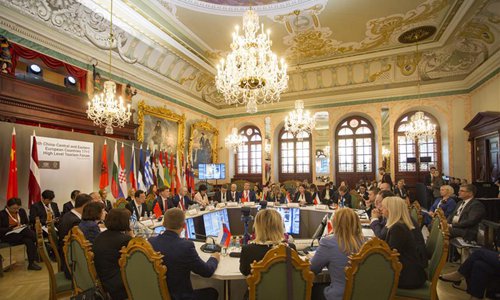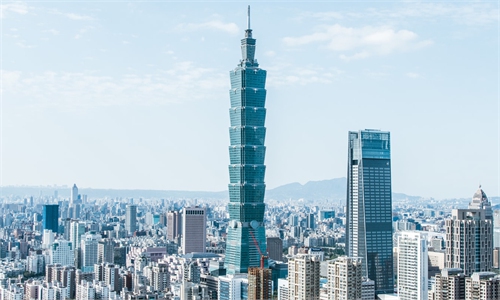
Participants attend the 5th China-Central and Eastern European Countries (CEEC) 17+1 High-level Tourism Forum in Riga, Latvia, on Oct. 23, 2019. Photo: Xinhua
Lithuania, a small Baltic country with a population of less than 3 million, said over the weekend that it was quitting the "17+1" cooperation mechanism, a platform between China and Central and Eastern European Countries (CEECs). Just two days earlier, Lithuania's parliament on Thursday described China's treatment of Uygur as "genocide" and "crimes against humanity", echoing a bad lead of the US, Britain and Canada.The "17+1" platform is an open cooperation mechanism. If Lithuania feels that the cooperation is not working out as expected, there is no problem of it pulling out. But Lithuania clearly wants to highlight its exit and impress some Western powers, especially the US, that it is doing a great thing. Announcing the decision, Lithuania's Foreign Minister Gabrielius Landsbergis accused China of dividing the EU through the 17+1 mechanism, as if he feared that China would be indifferent about Lithuania's withdrawal.
This has always been Lithuania's behavior. It is one of the least populous countries in Europe, but has been politically radical since its independence, often acting as a flag raiser for anti-Russia moves and calling itself a "frontline state." While tensions with Russia are high, it also has poor relations with neighboring countries such as Belarus, and has a deep historical entanglement with Poland.
Lithuania became part of the Soviet Union in 1940 after World War II broke out and just before the German invasion of the Soviet Union. It is insecure for historical reasons and its loyalty to NATO and the US is far greater than the average members from Western Europe. It also has a radical hostile stance toward Russia that is out of proportion to its national power.
On the wall of the Town Hall in Vilnius, the capital of Lithuania, is written a quote from the former US President George W. Bush declaring during a visit to the country that "Anyone who would choose Lithuania as an enemy has also made an enemy of the United States of America." Ensuring that this line remains effective seems to have become the primary purpose of Lithuanian diplomacy, which is all about doing its best to prove its allegiance to the US. Winning US' admiration has also become the main guide to Lithuania's daily diplomatic practice.
In fact, Xinjiang affairs were far away from Lithuania's concerns. There are much more urgent problems that need to be addressed in the country. And it is never Lithuania's turn to interfere in China's internal affairs even when European countries want to meddle with. That's how far this small Baltic country has gone. On other issues such as the island of Taiwan, Lithuania announced in March that it would open a trade representative office on the island to promote its relations with Taiwan.
Lithuania's performance this year fits well with the Chinese idiom: "contemptible scoundrel." But we don't need to be angry at it. Lithuania is a small country, whose population is less than a district of one of China's first-tier cities. All of its narratives against China are only symbolic. They are temporary echoes of the US strategy against China. If Lithuania respects itself, we will respect it. If it is blindly arrogant, and even intends to provoke China, we will neglect it.
When such a small country is aggressive, proactively placing itself to become a tool of great power competition, it will invite trouble. The geopolitics of the Baltic region is very complex. In the region, various extreme historical memories heavily overlap. Today, instead of mulling over how to dissolve old hatreds, Lithuania constantly starts new ones. Lithuania will reap what it has sown.
Without Lithuania, the China-CEEC cooperation mechanism will have less interference and will become more pragmatic. Unlike ideology, under the China-CEEC cooperation mechanism, what is more important is tangible outcomes, rather than the number of countries involved in it. There is no problem with Lithuania's withdrawal from the mechanism. But we suggest the country should keep away from China's core interests. Lithuania is not qualified to attack China and this is not the way a small country should act.



